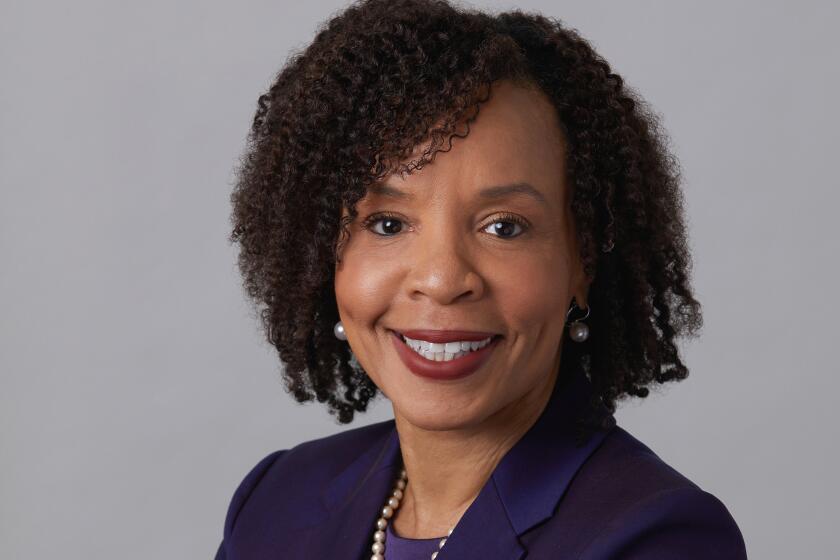Two Rivals Who Seldom Got Beyond the Primary : Election: Riordan and Woo never went beyond preaching to their choirs to offer an overarching vision. How could such unlikable guys govern?
Uncle!
As the campaign for mayor of Los Angeles slimes to a close, there’s little else to do but hose off candi dates Richard Riordan and Michael Woo and get back to the basic question: What difference does it make who wins?
Both Woo and Riordan will assemble a governing elite that looks like the city it must govern. No mayor can go back to the cadre of white men in gray suits who dominated City Hall before Tom Bradley. It is simply politically unacceptable.
Cosmetically, government may not look much different under Riordan or Woo, but the power equation won’t be the same. Both have relied on union support. Woo’s comes from the AFL-CIO and teachers’ unions, traditional Democratic allies. They’ll likely play influential roles in his administration.
Riordan owes a big debt to the Police Protective League. Initially, the police union’s endorsement underscored Riordan’s “tough on crime” message and opened up an important source of contributions and volunteers. Lately, the union, by sticking with him in the wake of his alcohol-related arrests and convictions, has helped keep Riordan credible on the crime issue. Indeed, it may have saved the Riordan campaign from hemorrhaging badly.
Like all mayors, both candidates will listen to the business community--Riordan and Woo have moved among the economic elite throughout their careers.
Riordan will attempt to transplant his corporate style of leadership to government. It’s what he knows best, what he’s been selling as his political strength. Businessman Riordan has assumed a non-ideological, results-oriented stance. “I look at the ultimate goals and the means are not important,” he told The Times. That ends-justifies-means credo may still be acceptable and effective in the business world, but it’s been a long time since democratic government has worked that way.
Despite his many liberal social views, Woo is also selling himself as a problem-solver. But can the complex problems of an economically depressed city be solved by repeating the urban-planning mantras of the booming ‘60s and ‘70s?
The bottom line is that both candidates are pragmatists, and their administrations would likely reflect that approach. Unfortunately, pragmatism in politics doesn’t always lead to resolution of the crises of governance. The first goal of political pragmatists is to get reelected. For that reason, no matter who wins, many hard choices will continue to be avoided.
How might each candidate handle relations with the City Council? Five members have endorsed Riordan; four have endorsed colleague Woo. That shows, some argue, that Riordan will have a slightly easier time with the powerful, and sometimes volatile, body. But neither candidate can claim the fealty of a working majority of the council members.
There are three tools a mayor can use to make that arithmetic possible: the carrot, the stick and the bully pulpit. Money, strategically placed, can pay for both carrots and sticks. A council member may be more willing to go along with a mayor who can reciprocate by pouring money and political capital into a tough race or lending clout on important issues. A council member could also feel more obligated to play ball with a mayor who might raise money for--and contribute to--his or her opponent.
That’s why some City Hall insiders speculate that Riordan may have a better chance to cow the City Council. He has money and an established record of generous political contributions.
Others argue Woo will have President Bill Clinton, who endorsed him and who has a lot more largess to spread around. But Clinton’s ability to help Woo reward friends depends on the state of the economy and his own popularity. Nobody should bet on the strength of either, yet.
In any case, much of what can be accomplished in the policy arena is out of the mayor’s hands. Despite the distinctions candidate Woo would like to draw, such issues as abortion rights and gun control are largely in the domain of the state and federal governments. The city’s ability to balance its budget without bloodshed rests with Sacramento. Since Riordan and Woo are well-connected, both will have access in Washington and the Capitol to plead their cases.
But neither candidate has shown much of a gift for oratory or suasion. That might not matter, because the bully pulpit simply may not be available to either of them. How can the next mayor be an effective advocate if he enters his office too bloodied by negative campaigning to see where he’s going? Worse, there is little indication that Los Angelenos are ready to listen.
There are disturbing messages in pre-election polls. First, with the exception of inroads by Woo among Jews and moderates, the battle lines formed in the primary appear to have hardened for the runoff. According to a recent Times poll, voters remain Balkanized, ethnically and geographically. Woo remains ahead among minorities and residents of South-Central, while Riordan still leads among white conservatives and San Fernando Valley residents. In the last days of the campaign, both candidates are exhorting, again, their divergent bases and slighting the realities of governing a diverse city.
Second, voters don’t much like either candidate. Both men have unfavorable ratings higher than their favorable ratings. As pollster Mark Baldassare noted in his recent KCAL/KFWB survey, “A sobering statistic for the winner of this race . . . is that the next mayor of Los Angeles will be viewed favorably by only one in three voters.”
If Los Angelenos decide to turn out, many will hold their noses and vote for the lesser of two evils. The Times poll showed that a remarkable 57% view their candidate in that light. The KCAL/KFWB poll indicated that fully 50% are dissatisfied with their choices.
That says--no matter what the winning margin is--Tuesday’s victor cannot claim a mandate. What does it mean for the future of the city when its mayor is elected with little more than the grudging consent of the governed?
Recently, Ethel Kennedy reminisced on television about the train trip the body of her husband, Robert F. Kennedy, took home 25 years ago. “On one side of the tracks would be the white people,” she recalled, “and on the other side would be the black people. And . . . here was a man who brought them together.”
That train could be a metaphor for Los Angeles. On one side of the tracks is the Anglo electorate, while on the other is the city’s multiethnic population. But, thus far, neither candidate for mayor has shown the ability--nor desire--to bring both sides together.
More to Read
Get the L.A. Times Politics newsletter
Deeply reported insights into legislation, politics and policy from Sacramento, Washington and beyond. In your inbox three times per week.
You may occasionally receive promotional content from the Los Angeles Times.






